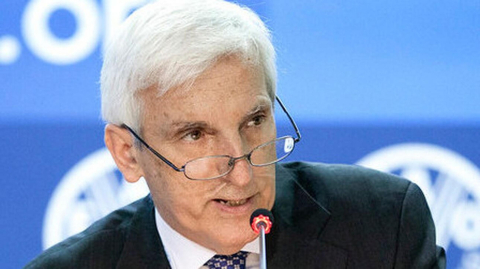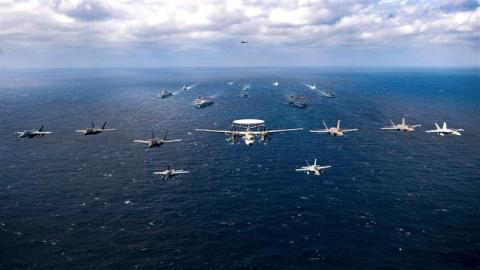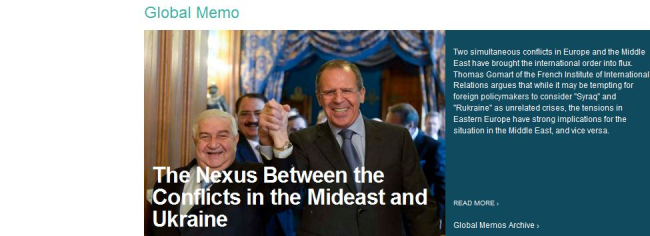3299 publications
Web social et djihadisme : du diagnostic aux remèdes
From Al Qaeda to Islamic state, the international jihadist movement understands how to adapt to the web’s evolution, which it is using as an operating platform.
East-Mediterranean Gas potential: Opportunities and Barriers
A report released by Insight_e, the European energy consortium specialised on energy policy research and analysis
Lead authors: Constantinos Taliotis (KTH) and Maïté de Boncourt (Ifri), Authoring team: Kimon Keramidas (Enerdata), Reviewer: Paul Deane (UCC)
The Nexus Between the Conflicts in the Mideast and Ukraine
Two simultaneous conflicts in Europe and the Middle East have brought the international order into flux. Russia’s annexation of Crimea and destabilization of eastern Ukraine have deeply undermined European security. Meanwhile, the self-declared Islamic State’s proclamation of a caliphate in western Iraq and eastern Syria has unsettled the Middle East. While it may be tempting for foreign policymakers to consider "Syraq" and "Rukraine" as unrelated crises, the tensions in Eastern Europe have strong implications for the situation in the Middle East, and vice versa. Indeed one of the greatest challenges to global governance is the combination of an assertive and declining Russia, and a disintegrating Middle East.
|
Global Memos are briefs by the Council of Councils that gather opinions from global experts on major international developments. The Council of Councils is a Council on Foreign Relations initiative connecting leading foreign policy institutes from around the world in a common conversation on issues of global governance and multilateral cooperation. The Council of Councils draws on the best thinking from around the world to find common ground on shared threats, build support for innovative ideas, and introduce remedies into the public debate and policymaking processes of member countries. The membership of the Council of Councils includes leading institutions from twenty-five countries, roughly tracking the composition of the Group of Twenty (G20). The network facilitates candid, not-for-attribution dialogue and consensus building among influential opinion leaders from established and emerging nations. FOUNDING COUNCIL OF COUNCILS MEMBER THINK TANKS
|
China’s Emerging Middle Class: What Political Impact?
This research paper argues that, contrary to what is often believed, most of the Chinese middle class appears to be politically conservative, and may not challenge the current political order as much as is expected, for several reasons; first of all, because of its strong connection to the Communist Party of China and the civil service in broader terms. Nonetheless, Chinese middle households are increasingly voicing their concern about a set of issues directly affecting them, such as pollution, either in the street or online.
The New Dimensions of Geopolitics
Editor: Deborah Sherwood, published by Cligendael International Energy Program (CIEP) and Institut français des relations internationales (Ifri)
Local Content Strategies in the Oil and Gas Sector: How to Maximise Benefits to Host Communities
Editor: Deborah Sherwood, published by Institut francais des relations internationales (Ifri)
Is Natural Gas Green Enough for the Environment and Energy Policies?
Editor: Deborah Sherwood, published by Clingendael International Energy Program (CIEP) and Institut français des relations internationales (Ifri)
International Law and the Use of Maritime Hydrocarbon Resources
Editor: Deborah Sherwood, published by Clingendael International Energy Program (CIEP)










